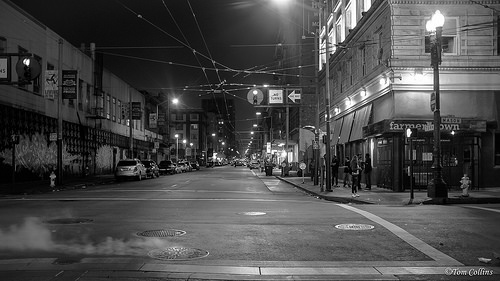Most of my recent writing has happened in the city due to travel, teaching, and other time constraints. When I told my students, they struggled to believe that I got the ideas for my essays and fiction from a metropolitan area. They assumed that I — like many writers they had met or read about — spent months at a cabin or retreat typing away in isolation.
Many talented writers and artists talk about isolating themselves in nature, and I myself have been fortunate to get writing residencies in some of the most beautiful regions of the world. It’s no wonder people think being out in the country is the purest way to inspire art. As a writer who is blind, I find that spending time in nature can be very constructive to writing: The sound of birds chirping, the scent of ancient trees, and the peaceful song of branches dancing in the wind always lead to inspiration.
But getting a writing residency is very competitive, and many writers can’t afford to leave their daily lives for weeks or months to focus on their craft. For any writer who feels stunted because they can’t escape to a natural place, I’d like to tell you about urban inspiration.
Tapping Into Every Sense
We’re often told to look up at the sky or to a lavish garden for inspiration. Being in nature forces people to use their senses to absorb instead of analyze. The smells, colors, and animals that serve as muses trigger memories and help us conjure up other worlds.
When I lost my sight, the doctor told me our brains receive 80 percent of information through our eyes. The rest is distributed among the other four senses. In other words, vision is distracting.
I often asked my friends and family members to decode unfamiliar noises or scents and soon realized most people don’t know the smells, sounds, or the feel of their own cities.
Great writers can bring every sense into their story. The books I love the most are those that leave me with distinct scents, flavors, and sensations on my skin. Learning to describe urban places is just as important as writing about a forest or a lake. Although you may not have noticed, your city has a story to tell just as much as nature does, and learning to use your senses in an urban environment can become a powerful writing tool.
Connecting to Your Environment
I’m sure by now you’re wondering how to deploy this urban inspiration technique. Here are some tips to help you open your senses:
1. Listen. Start by closing your eyes and learning the noises that make up the soundtrack on your street. Once you identify them, learn who or what makes them. If it’s a car, find out the make and model. Write the sound out in its onomatopoeic form, and start a list. You’ll be surprised how those sound words can come in handy when writing memoir or fiction. Researching something you hear can also lead you to a story.
2. Feel and Smell. Take a walk. Get to know the physical feelings and scents of your city. Find out what the bus stops feel like and what they are made from. Figure out the smells on busy streets. Go into coffee shops, restaurants, or markets and investigate what ingredients are calling your nose.
3. Notice Colors. Although I’m totally blind, I still notice colors. I have a machine that reads colors on objects in a robotic voice. I walk to places and scan things to get a reading. I get strangers on the street involved by asking for their feedback on a color. After asking three to five people the same question, I end up with a list of different ways to express the same shade of paint.
Sometimes, I ask people what color their neighbors’ houses are, and I’m never surprised when they don’t know. Learn the color palette of your street. Learn the different shades of blue that make up the sky above your house and pay attention to the time of day.
4. Get to Know People and Places. In researching my second book, I delved into my city for inspiration. I visited the car museum to get the feel for seats and steering wheels. I wanted to touch with my hands and see how cars have evolved in the past 100 years. I went to a Buddhist temple to get the sense of the energy during chanting and met with a perfume maker to learn the vernacular of fragrances.
Each place and person I experienced in my city helped inspire hours of writing. Your city has a wealth of people with different experiences and backgrounds, and many cities also have treasure troves of history and culture waiting to be discovered.
Nature works as a conduit for creativity because isolation helps people tap into all of their senses. Most people think the only way to produce art is by running away to some desolate place. The truth is that my inspiration comes from experiencing the world around me — whether I’m in the country or the city.
Opening your mind to experience the world in different ways is an integral part of writing. Until we fully learn to absorb and experience the world we live in, we’ll never be able to communicate or connect our readers to that world.
Who is Belo Cipriani?
Belo Cipriani is the Writer-in-Residence at Holy Names University, a spokesperson for Guide Dogs for the Blind, the “Get to Work” columnist for SFGate.com, and the author of Blind: A Memoir. You are invited to connect with him on Facebook, Twitter, Google+ and YouTube.

